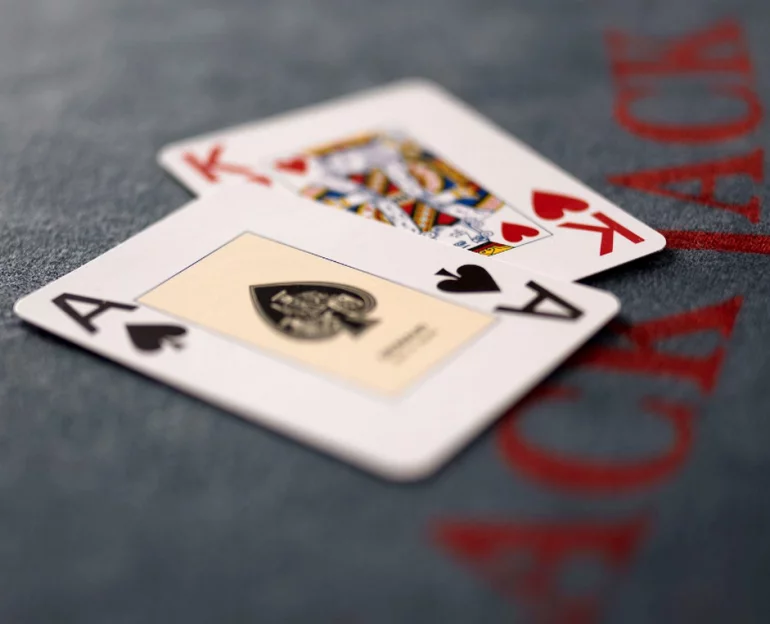Many novice players experience mixed feelings about aces. To be sure, if they get this card, they like it. However, when the dealer reveals an ace, they truly hate it. Nevertheless, even in this situation, it is not so bad if you know how to act.
Why Is the Dealer's Upcard Ace So Dangerous?
Let's discuss which benefits the ace may provide for the player and the dealer, then consider different situations in which this card appears on the table and learn how to use it.

So, why don't we like to see this card in the dealer's hand? It becomes evident if you familiarize yourself with statistical data.
Let's imagine that we are playing one of the American versions. Blackjack was not dealt to the croupier, so you had an opportunity to hit.
- A face-up ace in this situation means he may bust in 17% of cases at most.
- He will have 17, 18, 19, and 20 in 19% of rounds (for each of these total scores).
- A 21 (not blackjack) will be formed in over 7% of cases.
As for the possible loss of money, this situation does not seem optimistic. The dealer rarely loses with a face-up ace.
Even if you play according to the basic strategy, the house edge in many versions of blackjack in this case is approximately 36%.
Therefore, if you bet one hundred dollars, you can return only sixty-seven (we are talking about the long run and not about each round.)
What to Do with the Dealer's Ace in Blackjack
When the dealer shows an Ace in blackjack, it can be one of the most challenging situations for players because the dealer has a strong chance of having a blackjack or a hand close to 21. Here’s what you should consider doing when the dealer shows an Ace:
1. Consider Insurance
- Insurance Bet: If the dealer shows an Ace, they will offer you the chance to take "insurance," which is a side bet that pays 2:1 if the dealer has a blackjack (a ten-value card as their hole card).
- Basic Strategy Advice: Most basic strategy charts recommend not taking insurance because it’s generally a bad bet with a high house edge. The odds are not in your favor in the long run.
2. Evaluate Your Hand
Soft Hands (Hands with an Ace):
- Soft 17 (A-6) or Lower: In most cases, you should hit. This is because your hand has the flexibility of using the Ace as 1 or 11, giving you a better chance of improving your hand.
- Soft 18 (A-7): This hand can be tricky. Generally, basic strategy advises standing against the dealer's Ace in most game variations, but hitting or doubling down may be considered in certain variations of blackjack (like when the dealer hits on soft 17).
- Soft 19 or Higher (A-8 or A-9): You should stand. These hands are strong enough to stand without the risk of going bust.
Hard Hands (Hands without an Ace or with Ace counted as 1):
- Hard 17 or Higher: You should stand. Your hand is strong enough to stand, even against the dealer's Ace.
- Hard 16 or Lower: Basic strategy generally advises hitting, especially when facing a dealer's Ace, because the chances of the dealer having a strong hand are high. However, if you're holding a hard 12-16, you're in a tough spot, and hitting is usually the best option, despite the risk of busting.
3. Consider Surrendering:
- Surrender (If Available): If the game rules allow for "surrender," this can be a good option when the dealer shows an Ace. By surrendering, you forfeit half your bet and end your hand. This option is generally considered when you have a weak hand, like a hard 15 or 16. Surrendering is a way to minimize your losses when the dealer is likely to have a strong hand.
4. Double Down
- Double Down: Doubling down when the dealer has an Ace is usually not recommended, except for certain soft hands (like A-7 or A-8) in specific game rules. Most of the time, it’s safer to just hit rather than risk doubling your bet when the dealer has a strong upcard.
When the dealer shows an Ace, you are likely facing a tough situation. The best approach is to follow the basic strategy:
- Avoid insurance.
- Hit with weak hands, especially hard 16 or lower.
- Stand with strong hands, particularly soft 19 or higher and hard 17 or higher.
- Consider surrendering with hands like a hard 15 or 16 if that option is available.
Remember, blackjack is a game of strategy and chance, and following the basic strategy gives you the best chance of success in the long run.
Practice blackjack with the help of these free games.
| Name | Soft | RTP | ||
|
|
99.92% | |||
|
|
99.91% | |||
|
|
99.87% | |||
|
|
99.78% | |||
|
|
99.71% | |||
|
|
99.7% | |||
|
|
99.69% | |||
|
|
99.65% | |||
|
|
99.63% | |||
|
|
99.63% |
Conclusion
These are the basic recommendations for situations when the dealer has a face-up ace. They will help you play more successfully.
Remember that maximum efficiency requires each version's correctly selected and mastered basic strategy. Print a table and get a peep of it whenever you are unsure about your decisions.
More advice for blackjack players is available in the special section of Casinoz.





















